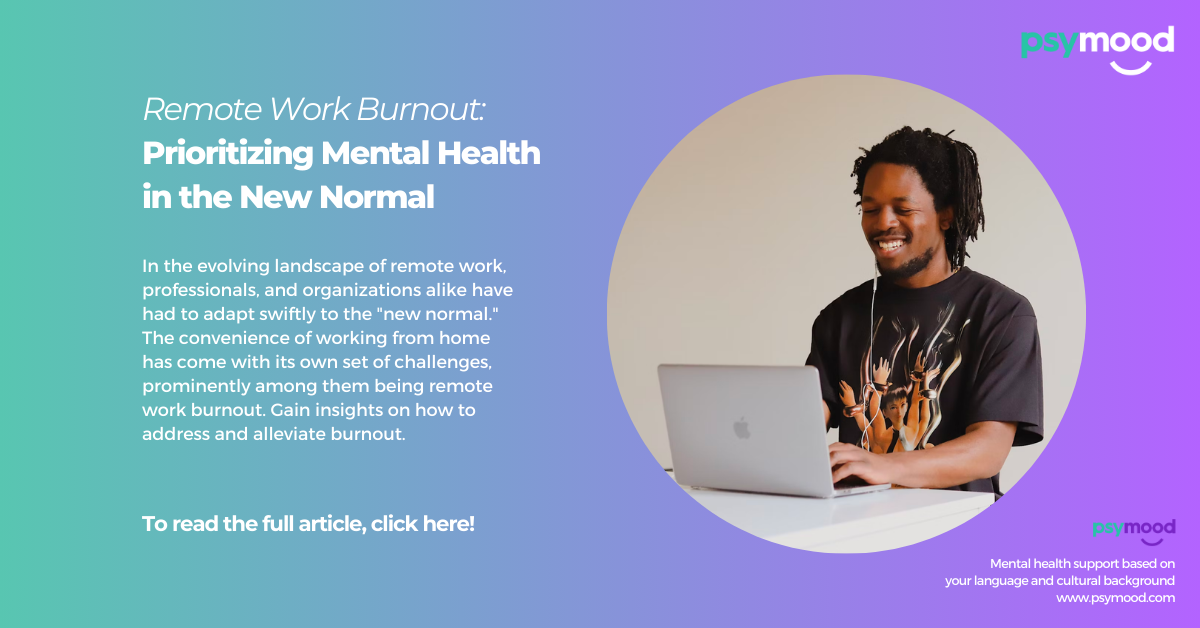Remote Work Burnout: Prioritizing Mental Health in the New Normal
In the evolving landscape of remote work, professionals, and organizations alike have had to adapt swiftly to the “new normal.” The convenience of working from home has come with its own set of challenges, prominently among them being remote work burnout. As the need for better mental health support grows, PsyMood, with its 20 years of expertise in mental wellness, offers invaluable insights on addressing and alleviating burnout in this comprehensive business article.
The Rise of Remote Work Burnout
As remote work became the norm, the blurred lines between professional and personal life have intensified. The constant availability and pressure to perform have taken a toll on employees’ mental health. To combat this issue, individuals and organizations must recognize the symptoms of burnout and prioritize mental wellness.
- Recognizing Burnout Indicators: Professionals need to identify signs of burnout, such as chronic fatigue, decreased productivity, and emotional exhaustion. Regular self-assessment and open communication can help in early detection. Five ways to combat Burnout
- Establishing Boundaries: Setting clear boundaries between work and personal life is essential. Encourage employees to define their work hours and switch off from work-related communication outside those hours.
- Encouraging Mental Health Days: Organizations can promote the use of mental health days for employees to recharge when needed. A work culture that supports employees’ well-being is more likely to mitigate burnout.
- Providing Employee Assistance Programs (EAPs): EAPs can offer valuable resources, including counseling and mental health services, to help employees cope with stress and burnout.
- Flexible Work Schedules: Consider flexible work schedules that allow employees to adjust their hours to better fit their personal lives. Flexibility can help reduce the stress associated with remote work.
Remote Work and Loneliness
Remote work can lead to feelings of isolation and loneliness. The lack of in-person interactions and causal watercooler conversations can be isolating. To address this issue, PsyMood explores techniques to combat loneliness and foster connections in virtual workspaces.
- Virtual Team Building: Encourage virtual team-building activities, such as online games, team challenges, and informal virtual meetings, to build camaraderie among remote team members.
- Regular Check-Ins: Managers should conduct regular one-on-one check-ins with team members to discuss not only work-related matters but also personal well-being.
- Mentorship Programs:Implement mentorship programs to connect experienced employees with newer team members, fostering professional and personal development.
- Online Community Platforms: Create an online community platform for employees to interact, share experiences, and offer mutual support.
- Social Wellness Initiatives: Develop initiatives that focus on social wellness, such as virtual coffee breaks, hobby clubs, and wellness challenges to keep employees connected and engaged.
Stress Management and Remote Work
Stress management is pivotal in preventing burnout. The remote work setting can amplify stress levels due to the juggling of personal and professional responsibilities. In this section, PsyMood delves into the importance of stress management and offers practical strategies.
- Mindfulness and Meditation: Encourage the practice of mindfulness and meditation to alleviate stress. Offering virtual mindfulness sessions or resources can be a significant benefit.
- Stress Reduction Workshops: Organize stress reduction workshops for employees, where they can learn effective techniques for managing stress in the remote work environment.
- Physical Activity: Promote regular physical activity as a means to relieve stress. Encourage employees to take breaks and engage in exercises or stretches during the workday.
- Time Management Training: Offer time management training to help employees prioritize tasks and reduce work-related stress.
- Stress-Relief Resources: Provide resources on stress relief, such as articles, webinars, and self-help tools, to equip employees with the knowledge and skills to manage stress effectively.
The Role of Organizational Support
Organizations play a pivotal role in mitigating remote work burnout. By creating a supportive work environment and fostering a culture that prioritizes mental health, employers can significantly reduce burnout among their teams.
- Mental Health Policies: Develop comprehensive mental health policies that emphasize the organization’s commitment to employee well-being.
- Training and Education: Conduct training and educational programs on mental health for employees and managers, promoting awareness and understanding.
- Mental Health Resources: Offer easily accessible mental health resources, such as online counseling services and helplines, to provide immediate support.
- Flexible Work Arrangements: Allow employees to customize their work arrangements to better accommodate their mental health needs.
- Employee Feedback: Regularly seek employee feedback to assess the effectiveness of mental health initiatives and make necessary adjustments.
In the era of remote work, mental health and burnout prevention have gained paramount importance. By acknowledging the symptoms and implementing proactive measures, both individuals and organizations can effectively address and reduce remote work burnout. As the new normal continues to evolve, prioritizing mental health is not just a choice—it’s a necessity. Join PsyMood in advocating for mental wellness in the workplace, and let’s work together to build a healthier, happier remote work environment.
Let us know below in the comments section about any challenges you face at your company.
PsyMood offers Enterprise solutions for small, medium and large companies. For more information, email us at partnerships@psymood.com.
PsyMood is a digital tool designed to help you find the support you need in the language that you are most comfortable with. PsyMood considers cultural background, geographical location, interests, and personal needs, amongst other factors, to pair you with service providers for either online or in-person therapy sessions.
For More Interesting Posts
You may also be interested in learning more about
Boosting Employee Well-Being: Strategies for a Healthy Work-Life Balance During the Fall Season, Cultivating a Welcoming Workplace: Strategies for Refugee Employee Integration, and Home Sweet Work: Navigating the Housing Market’s Impact on Remote Workers Mental Health.
.


.png)
.png)
.png)
Recent Comments